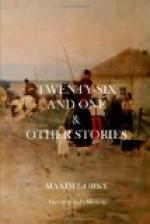Tchelkache came to himself. He felt within him that burning sensation that always seized upon him when his self-love as a dashing devil-may-care fellow was wounded, especially when the offender was of no account in his eyes.
“There he goes again!” he exclaimed fiercely. “You imagine, I suppose that I’m speaking seriously. I’m worth more than that, let me tell you!”
“Why, you funny fellow!” replied Gavrilo, again intimidated, “am I speaking of you? There are a great many like you! My God, how many unfortunate persons, vagabonds there are on the earth!”
“Take the oars again, dolt!” commanded Tchelkache shortly, restraining himself from pouring forth a string of fierce oaths that rose in his throat.
They again changed places. Tchelkache, while clambering over the bales to return to the helm, experienced a sharp desire to give Gavrilo a good blow that would send him overboard, and, at the same time, he could not muster strength to look him in the face.
The short conversation was ended; but now Gavrilo’s silence even savored to Tchelkache of the village. He was lost in thoughts of the past and forgot to steer his boat; the waves had turned it and it was now going out to sea. They seemed to understand that this boat had no aim, and they played with it and lightly tossed it, while their blue fires flamed up under the oars. Before Tchelkache’s inward vision, was rapidly unfolded a series of pictures of the past—that far distant past separated from the present by a wall of eleven years of vagrancy. He saw himself again a child, in the village, he saw his mother, red-cheeked, fat, with kind gray eyes,—his father, a giant with a tawny beard and stern countenance,—himself betrothed to Amphissa, black-eyed with a long braid down her back, plump, easy-going, gay. . . And then, himself, a handsome soldier of the guard; later, his father, gray and bent by work, and his mother, wrinkled and bowed. What a merry-making there was at the village when he had returned after the expiration of his service! How proud the father was of his Gregori, the moustached, broad-shouldered soldier, the cock of the village! Memory, that scourge of the unfortunate, brings to life even the stones of the past, and, even to the poison, drunk in former days, adds drops of honey; and all this only to kill man by the consciousness of his faults, and to destroy in his soul all faith in the future by causing him to love the past too well.
Tchelkache was enveloped in a peaceful whiff of natal air that was wafting toward him the sweet words of his mother, the sage counsel of his father, the stern peasant, and many forgotten sounds and savory odors of the earth, frozen as in the springtime, or freshly ploughed, or lastly, covered with young wheat, silky, and green as an emerald. . . Then he felt himself a pitiable, solitary being, gone astray, without attachments and an outcast from the life where the blood in his veins had been formed.




